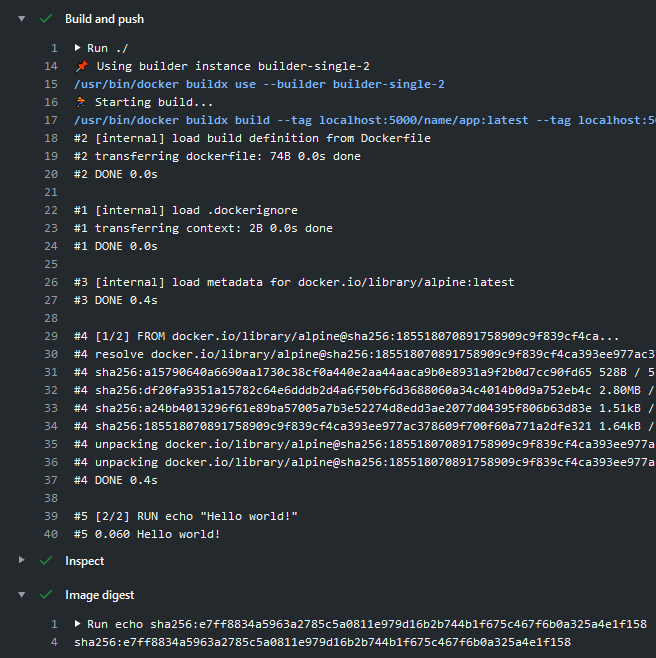12 KiB
Upgrade from v1
v2 of this action includes significant updates and now uses Docker Buildx. It's
also rewritten as a typescript-action to be as close as possible
of the GitHub Runner during its execution.
Upgrade notes with many usage examples have been added to handle most use cases but
v1 is still available through releases/v1 branch.
About
GitHub Action to build and push Docker images with Buildx with full support of the features provided by Moby BuildKit builder toolkit. This includes multi-platform build, secrets, remote cache, etc. and different builder deployment/namespacing options.
Usage
By default, this action uses the Git context so you don't need to use the
actions/checkout action to checkout the repository because this will be
done directly by buildkit. The git reference will be based on the event that triggered your workflow
and will result in the following context: https://github.com/<owner>/<repo>.git#<ref>.
Be careful because any file mutation in the steps that precede the build step will be ignored since
the context is based on the git reference. However, you can use the Path context using the
context input alongside the actions/checkout action to remove
this restriction.
In the examples below we are using 3 other actions:
setup-buildxaction will create and boot a builder using by default thedocker-containerbuilder driver. This is not required but recommended using it to be able to build multi-platform images, export cache, etc.setup-qemuaction can be useful if you want to add emulation support with QEMU to be able to build against more platforms.loginaction will take care to log in against a Docker registry.
Git context
name: ci
on:
push:
branches:
- 'master'
jobs:
docker:
runs-on: ubuntu-latest
steps:
-
name: Set up QEMU
uses: docker/setup-qemu-action@v1
-
name: Set up Docker Buildx
uses: docker/setup-buildx-action@v1
-
name: Login to DockerHub
uses: docker/login-action@v1
with:
username: ${{ secrets.DOCKERHUB_USERNAME }}
password: ${{ secrets.DOCKERHUB_TOKEN }}
-
name: Build and push
id: docker_build
uses: docker/build-push-action@v2
with:
push: true
tags: user/app:latest
-
name: Image digest
run: echo ${{ steps.docker_build.outputs.digest }}
Building from the current repository automatically uses the GitHub Token
so it does not need to be passed. If you want to authenticate against another private repository, you have to use
a secret named GIT_AUTH_TOKEN to be able to authenticate against it with buildx:
-
name: Build and push
id: docker_build
uses: docker/build-push-action@v2
with:
push: true
tags: user/app:latest
secrets: |
GIT_AUTH_TOKEN=${{ secrets.MYTOKEN }}
⚠️ Subdir for Git context is not yet supported (moby/buildkit#1684) but you can use the path context in the meantime. More info on Docker docs website.
Path context
name: ci
on:
push:
branches:
- 'master'
jobs:
docker:
runs-on: ubuntu-latest
steps:
-
name: Checkout
uses: actions/checkout@v2
-
name: Set up QEMU
uses: docker/setup-qemu-action@v1
-
name: Set up Docker Buildx
uses: docker/setup-buildx-action@v1
-
name: Login to DockerHub
uses: docker/login-action@v1
with:
username: ${{ secrets.DOCKERHUB_USERNAME }}
password: ${{ secrets.DOCKERHUB_TOKEN }}
-
name: Build and push
uses: docker/build-push-action@v2
with:
context: .
push: true
tags: user/app:latest
Advanced usage
- Multi-platform image
- Secrets
- Isolated builders
- Push to multi-registries
- Cache
- Local registry
- Export image to Docker
- Handle tags and labels
- Update DockerHub repo description
Customizing
inputs
Following inputs can be used as step.with keys
Listtype is a newline-delimited stringcache-from: | user/app:cache type=local,src=path/to/dir
CSVtype is a comma-delimited stringtags: name/app:latest,name/app:1.0.0
| Name | Type | Description |
|---|---|---|
allow |
List/CSV | List of extra privileged entitlement (eg. network.host,security.insecure) |
builder |
String | Builder instance (see setup-buildx action) |
build-args |
List | List of build-time variables |
cache-from |
List | List of external cache sources (eg. type=local,src=path/to/dir) |
cache-to |
List | List of cache export destinations (eg. type=local,dest=path/to/dir) |
context |
String | Build's context is the set of files located in the specified PATH or URL (default Git context) |
file |
String | Path to the Dockerfile. (default {context}/Dockerfile) |
labels |
List | List of metadata for an image |
load |
Bool | Load is a shorthand for --output=type=docker (default false) |
network |
String | Set the networking mode for the RUN instructions during build |
no-cache |
Bool | Do not use cache when building the image (default false) |
outputs |
List | List of output destinations (format: type=local,dest=path) |
platforms |
List/CSV | List of target platforms for build |
pull |
Bool | Always attempt to pull a newer version of the image (default false) |
push |
Bool | Push is a shorthand for --output=type=registry (default false) |
secrets |
List | List of secrets to expose to the build (eg. key=string, GIT_AUTH_TOKEN=mytoken) |
secret-files |
List | List of secret files to expose to the build (eg. key=filename, MY_SECRET=./secret.txt) |
ssh |
List | List of SSH agent socket or keys to expose to the build |
tags |
List/CSV | List of tags |
target |
String | Sets the target stage to build |
outputs
Following outputs are available
| Name | Type | Description |
|---|---|---|
digest |
String | Image content-addressable identifier also called a digest |
Troubleshooting
Keep up-to-date with GitHub Dependabot
Since Dependabot
has native GitHub Actions support,
to enable it on your GitHub repo all you need to do is add the .github/dependabot.yml file:
version: 2
updates:
# Maintain dependencies for GitHub Actions
- package-ecosystem: "github-actions"
directory: "/"
schedule:
interval: "daily"
Limitation
This action is only available for Linux virtual environments.





